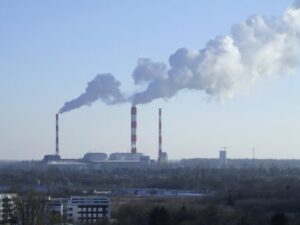On Tuesday in Strasbourg, the first reading of the revision of the Greenhouse Gas Emission Trading Directive, the so-called EU ETS for the period 2021-2030, was completed. Now the issue will be addressed by the EU Council – writes Karolina Baca-Pogorzelska from Dziennik Gazeta Prawna.
Poles abstain from voting
Although Janusz Korwin-Mikke, who came back to Polish politics, threatened MEPs on Monday evening during the debate before the vote by saying that they would go to prison for such nonsensical actions (he ended probably his last speech in the European Parliament traditionally with a sentence that „the EU must be destroyed”), they were rather not frightened. 535 MEPs (the full Parliament is 751) voted in favour of changes, 104 against and 39 abstained. The majority of Polish MEPs were in favour or abstained from voting. That is what PiS (Law and Justice) did, which Jadwiga Wiśniewska made clear during the Monday’s debate, saying that it could not support the project in its entirety.
– The functioning of the ETS must be more effective so that companies do not flee from the EU, they must be protected, but at the same time with Europe’s low carbon performance – said Gerben-Jan Gerbrandy, Dutch MEP. According to Kateřina Konečná, a Czech MEP, the adopted document will not fully satisfy anyone. The Greens argued that they were in favour of the reform, although it was not ideal, but certainly better than the provisions proposed at the very beginning of the negotiations. Bas Eickhout from the Netherlands also stressed that the ETS alone was not enough to fulfil the Paris Agreement, as national policies were still needed. Peter Liese, a German MEP, on the other hand, stressed that the mechanism adopted is clear – whoever pollutes will be punished and whoever does not, will be rewarded. Whereas Miguel Arias Cañete, European Commissioner for Energy, stressed that a solid framework was agreed for 10 years to support energy modernisation. – Many see us as a model. The EU reaffirms its determination to fight climate change – he said.
Conventional power generation will pay
The key elements of this agreement include: an increase in the linear emission reduction rate to 2.2% per annum from 2021 and a doubling of the volume of allowances allocated to the market stability reserve in the years 2019-2023 from 12% to 24% of allowances traded with the introduction of their cyclical deletion from 2023. According to the estimates of the EURELECTRIC European Energy Association, the price of a tonne of emissions will vary from EUR 19 to 34 in 2021-2030. Today it is less than EUR 10.
– The costs of revising the EU ETS Directive will fall mainly on the conventional energy sector. PKEE estimates that about PLN 130 billion will be needed for the purchase of CO2 emission allowances in the years 2021-2030 by members of the committee, i. e. the largest energy companies in Poland – says Henryk Baranowski, the Head of the Polish Electricity Association (PKEE is a member of EURELECTRIC). – The total value of the solidarity mechanisms for our country, i. e. the derogations provided for in the directive and the Modernisation Fund, is expected to be half of this amount. Despite this, the Modernization Fund and the derogation offer an excellent opportunity to finance ambitious projects of the Polish energy sector. Preparing for the regulatory changes, which are announced, among others, by the revision of the EU ETS Directive, PKEE members already today include in their business strategies investments in the construction of low-carbon, gas-based sources and electricity-based transport, energy storage and system heating – adds Baranowski.
– The main objective of the ETS is to reduce CO2 emissions in the most cost-effective way – for the economy, energy security, and society. The compromise reached between the European Parliament and the Member States, although not ideal, offers an opportunity for this. We have obtained additional emission allowances for the energy-intensive industries – our steelworks, producers of fertilizers, cement, paper, and ceramics. This is important because we cannot choose between reindustrialisation and jobs in the EU, and environmental and climate protection. We also defended good EP provisions and money for the modernisation and development of district heating – it is crucial for the effective fight against smog and solving the problem of energy poverty in Poland – commented Jerzy Buzek, Chairman of the Committee on Industry, Research and Energy (ITRE), who coordinated the work on ETS changes in this committee.
Modernization Fund will support the Polish sector
– Amendments to the ETS Directive were necessary because the rules of the scheme in the fourth trading period were based on overly optimistic assumptions. It is important, however, that European companies exposed to carbon leakage will continue to be protected, and that the energy sectors in countries in need of transformation, such as Poland, will receive funds from the system to cover part of the costs of the necessary modernisation. We are pleased that support and exceptional treatment will be given to the district heating sector, which in Poland is crucial for reducing not only CO2 emissions from outside the ETS sector, but also emissions of pollutants such as sulphur and nitrogen oxides or dusts. As part of the Modernization Fund, Poland is to receive about 135 million allowances, which makes us the biggest beneficiary of the fund, and this means billions of PLN for investments in the Polish energy and heating sector – said Andrzej Grzyb, MEP, who on behalf of the PO-PSL delegation coordinated work on the document in the Committee on the Environment, Public Health and Food Safety.








